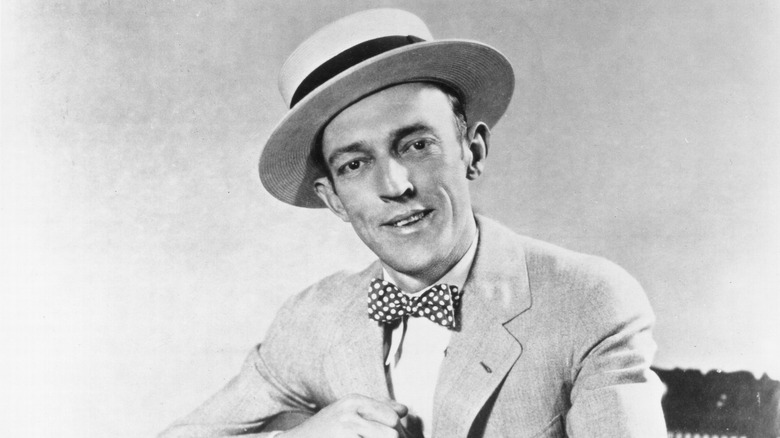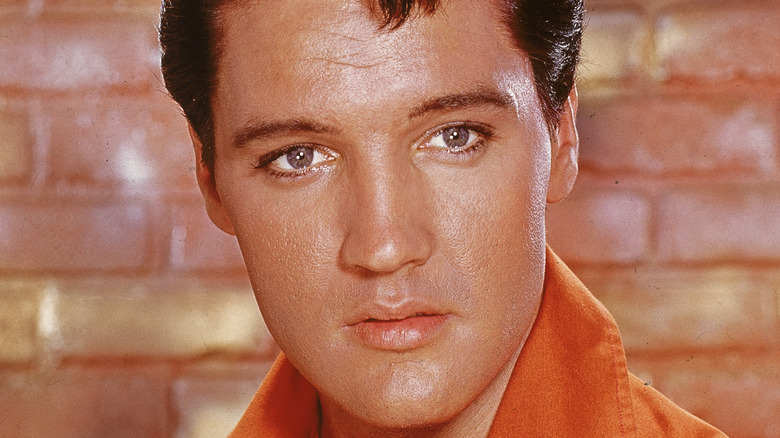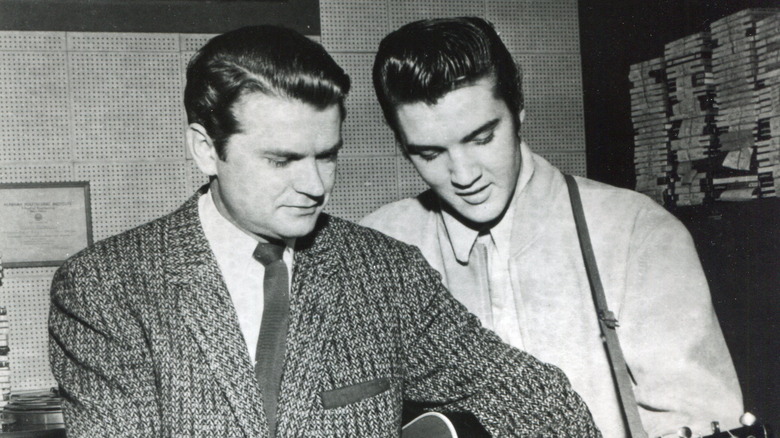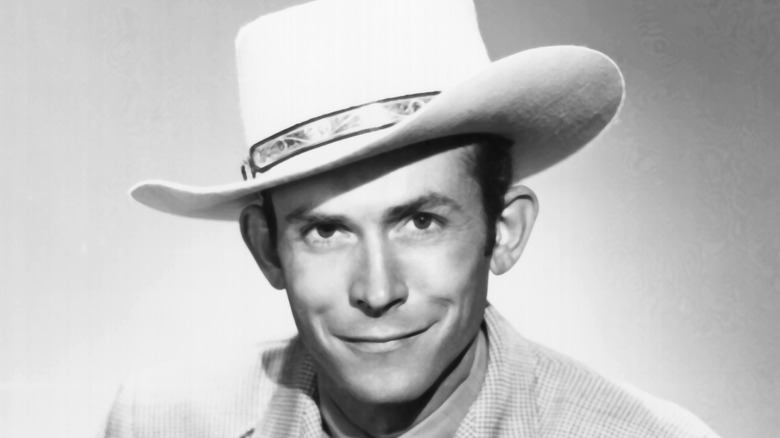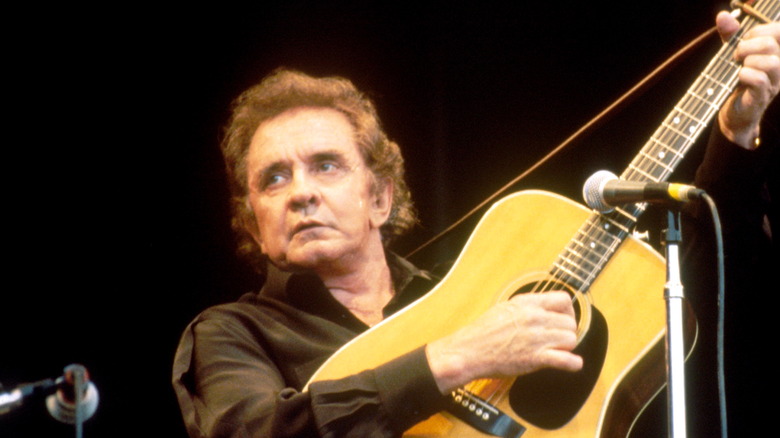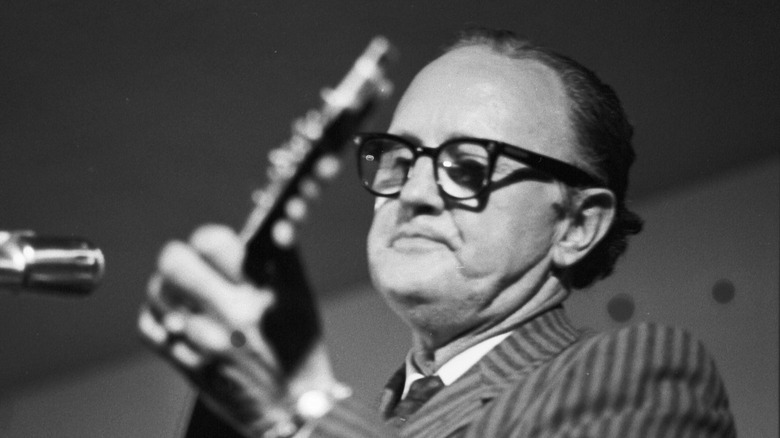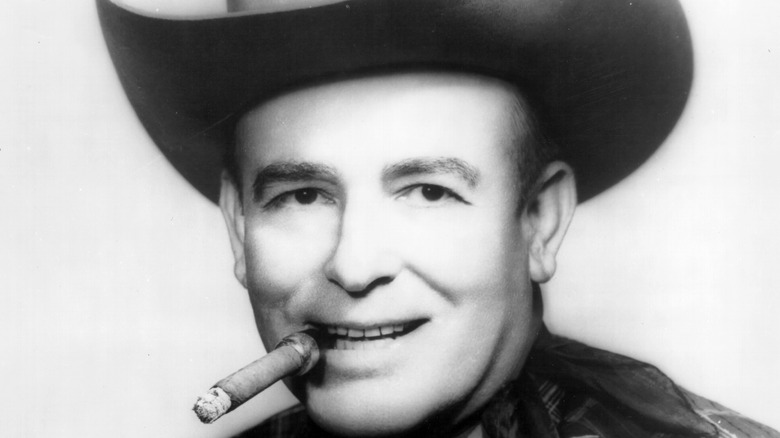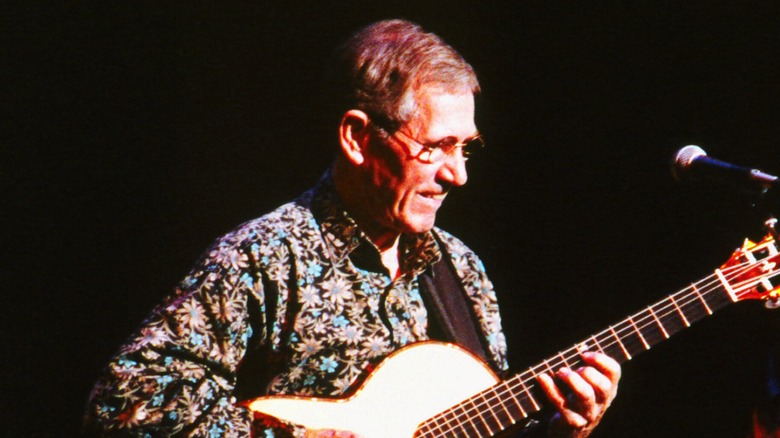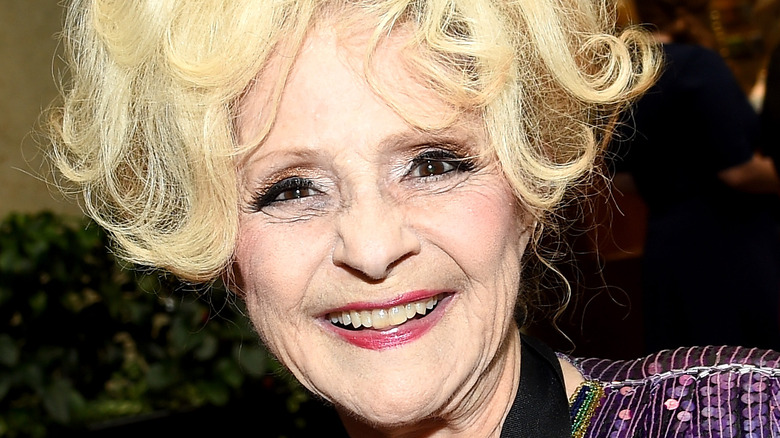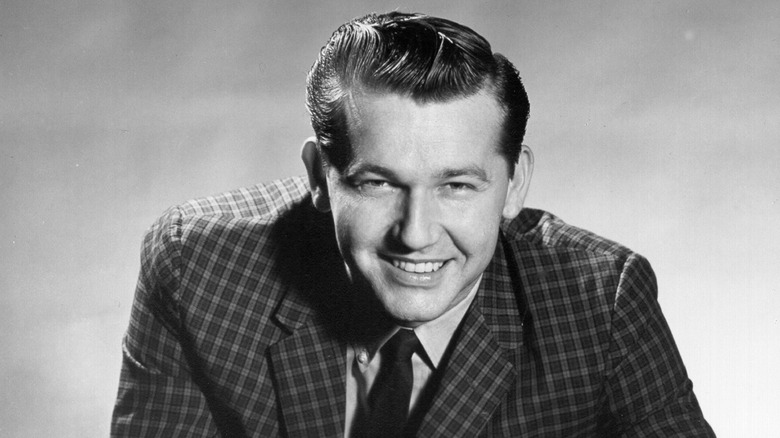Artists Who Are In The Rock And Roll Hall Of Fame And The Country Music Hall Of Fame
In the worlds of entertainment, sports, aviation, and many other fields, there is no more prestigious title than "Hall of Famer." It stands to reason that one would have to be tops in their chosen profession to even be considered for such an honor; heck, even if you're enshrined in the International Towing and Recovery Hall of Fame, that would have to make you one of the best darned tow truck operators to ever repossess some hapless dude's car. Really, how could the dude even be mad? He got his ride repo'd by the best.
Of all those to ever be enshrined in one hall or another, though, very few can lay claim to having received the honor twice. It seems to happen most often with the legendary Rock Hall of Fame in Cleveland, Ohio; Paul McCartney, for example, has been inducted both as a solo artist and as a member of some band called the Beatles. This happens even more rarely with Nashville's Country Music Hall of Fame, but happen it does: Roy Rogers, for instance, was inducted for his solo work, and also for his tenure with the Sons of the Pioneers. But it's the exceedingly rare artist that has such a profound influence on two separate musical genres that they are judged to be fit for induction by both of those hallowed halls. Since you read the title of the article, though, you know that it does indeed happen — and we're about to take a look at every artist to have achieved the feat.
Jimmie Rodgers
Singer and guitarist Jimmie Rodgers, a former brakeman for the railroads who turned to the entertainment industry when tuberculosis forced him to give up his vocation, rose to prominence in the late 1920s before the term "country music" existed. (The early form of the genre was most often referred to as "hillbilly music," because people back then were far blunter.) According to Rodgers' Hall of Fame bio, he was among the first artists of any genre to achieve fame on the strength of his recordings, rather than on live performances only — and whether he was recording ballads, barnburners, or novelty tunes, his buoyant personality and distinctive voice set him apart. His peerless skill at a particular "hillbilly" vocal style earned him the nickname "The Blue Yodeler." (Remember "In the Jailhouse Now" from the Coen Brothers' "O Brother, Where Art Thou?" Yeah, that was Jimmie.)
Rodgers is often referred to as the "Father of Country Music," and as such, he was among the Country Hall's inaugural inductees in 1961. Since rock as we know it wouldn't exist without country, the administrators of the Rock Hall had the good sense to induct him in its inaugural year of 1986. Unfortunately, the tuberculosis that steered him toward his legendary career would eventually take his life, and according to Mississippi History Now, Rodgers knew his death was coming — and even sang about it. Following a week-long recording marathon in May of 1933, Rodgers died of complications from the disease at the age of 35.
The Everly Brothers
That Phil and Don Everly were inaugural inductees into the Rock Hall of Fame in 1986 should come as no surprise; just have a listen to a couple of their early singles, like "Bye Bye Love" or "Wake Up Little Susie," and their influence on everyone from the Beatles to the Beach Boys to Simon and Garfunkel is glaringly obvious (via the New York Times). The Everlys' own influences, though, might be slightly less so. The duo were born two years apart to a musical family; their father Ike, according to Knoxville News Sentinel, was a guitarist and songwriter who had had some success performing on radio shows in Illinois and Iowa, and it was from him that the brothers came by their love of roots country music, with its picked guitars and close vocal harmonies. When the brothers launched their own music career, they did it from their home base of Nashville, using local session musicians — all factors which lent their rollicking rock numbers a distinctly country flavor.
According to the Country Hall's website, the brothers' country bona fides were recognized early by the Nashville establishment — they became members of the Grand Ole Opry way back in 1957, and from their 1958 album "Songs Our Daddy Taught Us" to 1968's "Roots," they wore their country influences on their sleeves. But somehow, it took until 2001 for the Hall to induct the pair, who did more than almost any other act to bring the worlds of country and rock together.
Elvis Presley
Another inaugural inductee into the Rock Hall, Elvis Presley is obviously associated most closely with that genre — he was the King of Rock, for Pete's sake. But some of his legions of fans might be unaware that his contributions to country music were as great or greater than his contributions to rock — for while Elvis was among the first artists to fuse country with rhythm and blues, his first recordings after signing to the legendary Sun Records were sold in the country market.
According to the Country Hall's website, Elvis entered this market at a time when country was still considered to be a regional phenomenon, and it was his early records for Sun — along with his appearances on the popular television music showcase "Louisiana Hayride" — that began to change this perception during the early-to-mid '50s. In 1956, the King jumped to RCA/Victor and began cutting tunes with a harder rock edge — but in his brief time with Sun, he had helped to expand country's audience greatly, paving the way for future legends like Johnny Cash, Marty Robbins, and Sonny James. Elvis was inducted into the Country Hall in 1998, three years before Sam Phillips, the man without whom his illustrious, genre-shattering career might never have come to be.
Sam Phillips
Sun Records founder Sam Phillips — an inaugural inductee into the Rock Hall – created a rockabilly sound by merging the blues he loved with country. A former radio DJ from Alabama, Phillips relocated to Memphis to found his tiny record label with the aim of helping talented amateur musicians get their sounds on vinyl (according to the New York Times). Help them, he did — through Sun's doors would come such blues legends as B.B. King, Howlin' Wolf, and Roscoe Gordon, as well as country-influenced white performers like Jerry Lee Lewis, Roy Orbison, Johnny Cash, and Charlie Rich, all of whom owe their careers to Phillips — and it was in the merging of the two styles that Phillips found a secret sauce.
The five singles that he cut for Presley likely cemented his place in the Country Hall by expanding the genre's reach, but they also proved to Phillips that there was a vast market for music that all the young dudes and chicks could relate to. Phillips' willingness to tap into the youth market, as well as his insistence on straightforward, soulful delivery and refusal to polish the rough edges of his artists' sounds, helped to define rock and roll in its infancy. It could be argued that few individuals have done more to put the "popular" in "popular music" — which could be why, in addition to the Rock and Country Halls of Fame, he's also been inducted into the Blues and Rockabilly Halls, according to the Sun Records website.
Hank Williams, Sr.
There are, put simply, few country artists as rock and roll as Hank Williams. As described by the Country Hall's website, Williams began his music career at roughly the same time that his hands were big enough to hold a guitar; he formed the first iteration of his backup band, the Drifting Cowboys, at the age of 15. A skinny guy stricken with spina bifida, Williams managed to become a regional star in Montgomery, Alabama playing standard "hillbilly music" tunes by the time he was 21. By 26, he was a veteran recording artist writing his own songs to great acclaim while being accepted into the Grand Ole Opry. At 28, despite the crippling effects of his condition and a severe alcohol problem, both issues that had dogged him for his entire career, he was hands-down the biggest star in country music — and he didn't live to see 30.
Williams built his reputation as a performer through his plainspoken yet expressive delivery, and as a songwriter by delivering original tunes with a level of craftsmanship that allowed them to transcend genre, earning him his place in the Rock Hall. More than a few of those songs have been covered by artists as diverse as James Brown, Red Hot Chili Peppers, Cat Power, and Norah Jones (via Wide Open Country). It would be tough to overstate the influence of Williams' songcraft — it's not for nothing that he was also a shoo-in for the Songwriters Hall of Fame, or that he was awarded a posthumous Pulitzer Prize.
Johnny Cash
There are rock stars, there are country stars, and then there is Johnny Cash, who embodied the most outrageous and daring aspects of each persona for decades while carving out a notably uncompromising career. Cash cut his first recordings in his early 20s for Sun Records, and even these — including tunes such as "Don't Take Your Guns to Town" and his signature song "Folsom Prison Blues" — straddled the line between the roots country music he grew up on and the young, hip rockabilly music that was snowballing in popularity. With his booming baritone voice and uncanny knack for crafting vivid narratives, Cash was among a handful of artists to regularly land hits on both the pop and country charts, according to the Country Music Hall's website.
His battle with an addiction to prescription painkillers, not to mention a few high-profile run-ins with the law, failed to derail his career in the '60s and '70s — and after his induction into the Country Hall in 1980, he retired as a legend, his legacy secure. Psych! Actually, Cash saved the best work of his career for his twilight years, teaming up with legendary producer Rick Rubin for the 1994 album "American Recordings" and a series of four companion albums. In 2002, the year before his death, Cash released his Rubin-produced cover of Nine Inch Nails' "Hurt" — a recording which quickly came to be regarded as among the finest covers of all time, and which cemented his 1992 induction into the Rock Hall as, well, a pretty good decision.
Bill Monroe
If there is one early musical genre that can be said to have influenced the modern iterations of country and rock equally, it would probably be bluegrass. With its wild finger-picking, intense vocal styles, and driving rhythms, it's easy to draw a straight line from '30s and '40s bluegrass to country artists like George Jones, rockers like Elvis, and even jam bands like the Grateful Dead — all of whom have legendary mandolinist Bill Monroe to thank for their inspiration (via NPR). Monroe wasn't just a bluegrass pioneer; he invented the form. His backup band was called the Blue Grass Boys. Now, we ask you: Can you think of another genre that was named after one guy's band? Because we cannot.
According to the Rock Hall's website, Monroe wasn't a big fan of rock — which is odd, because his tendency to push string instruments to the forefront of each composition, and his insistence on technical perfection from his band members, was rock and roll as heck. Coupled with his talent for frank lyrics and stark narratives, Monroe near-singlehandedly transformed the reputation of "hillbilly music" as unsophisticated garbage, simply by playing it super-freaking well. As noted by the Country Hall's website, Monroe preached the gospel of bluegrass for roughly two decades before people even started calling it that in the mid-'50s. His level of dedication to his craft seemed almost superhuman; at his induction into the Rock Hall in 1997, a year after his death, the great Emmylou Harris described Monroe in the only appropriate fashion. "Music," she said, "was his life."
Bob Wills and His Texas Playboys
Bob Wills may have actually been born playing the fiddle; according to the Country Hall's website, he played his first ranch dance on the instrument at the age of 10, in 1915. By 1930, he had made his first recordings with his five-piece string band, employing a style informed not just by roots country, but by the jazz and blues he had learned from his Black neighbors as a child. By 1940, that band, the Texas Playboys, had swelled to a whopping 16 members, with brass, strings, woodwinds, drums, and guitars all in the mix. His band's prowess and versatility soon earned him the nickname "The King of Western Swing," which is a pretty high honor. At the time, the "King of Swing," minus the qualifier, was bandleader Benny Goodman, whose name you may have heard once or twice.
Wills' band enjoyed raging success in the '40s — he even foreshadowed elements of Elvis' career by appearing in over a dozen Western swing-themed films throughout that decade. But it was more than just that rock star aesthetic that earned him his place in the Rock Hall, which credits him with being a towering influence on early rock recordings. Wills' skillful melding of genres, raucous stage banter, and call-and-response routines created something exciting and new that was truly ahead of its time.
Chet Atkins
When it comes to pure instrumentalism, few recording artists command more respect than Chester "Chet" Atkins. His ultra-distinctive picking style, influenced directly by roots country great Merle Travis, earned him the nickname "Mr. Guitar." He began his recording career in 1955 (notably, with a cover of the pop hit "Mister Sandman"); by that time, he had already shown such an affinity for the recording studio that his label, RCA, put him in charge of its Nashville studios. When the budding rock craze threatened to nip his career in the bud, he responded by tweaking his production technique to make it more pop-friendly, replacing the traditional fiddles and mandolins with vocal choruses and guitars — thereby pioneering what came to be known as the "Nashville Sound," according to the Country Hall's site.
The more-accessible sound helped to keep the country genre alive, and somewhat ironically, his prowess on the guitar would influence a number of rock giants — including George Harrison, the lead guitarist of the Beatles. It's this influence that earned him his place in the Rock Hall, but it's his sheer virtuosity that earned him his place in the hearts of country fans — not to mention the fact that he produced records for such legends as Jerry Reed, his idol Merle Travis, and Les Paul, whose name is perhaps even more synonymous with the guitar than even Mr. Guitar himself.
Brenda Lee
If the name Brenda Lee doesn't ring any bells, you're not necessarily alone. If nothing else, it's a safe bet that you hear one of her tunes — her 1960 rendition of the holiday standard "Rockin' Around the Christmas Tree" — at least a time or two per year. But her voice, one of the most versatile and indelible in all of popular music, has been paying her family's bills since she was in grade school, has been featured on hit recordings since 1957, and has sold more than 100 million records. Throughout the '60s, which began when Lee was all of 15 years old, she had more hit pop singles than any artist other than the Beatles, Ray Charles, and Elvis Presley (via Rolling Stone) — and in Nashville, her contributions to country music are so well-respected that she's become a beloved fixture of the city.
According to the Country Hall's site, Lee experienced her greatest success in the country genre later in her career, with hits such as "Nobody Wins" and "He's My Rock" coming in the '70s. But it was the constant stream of pop hits earlier in her career that blew the minds of such future superstars as John Lennon and Elton John, who places her in the top three female rock vocalists of all time alongside Janis Joplin and Tina Turner. Her induction into the Rock Hall in 2002 made her the only woman to be inducted into both Halls — until very recently.
Floyd Cramer
Pianists tend to be the unsung heroes of both rock and country, and any budding ivory-ticklers in either genre owe a debt of gratitude to one man: Floyd Cramer, whose innovative "slip-note" style redefined how the instrument could be played (via the New York Times). Perhaps it was because, as noted by the Country Hall's site, Cramer learned to play piano by ear that he developed his method of sliding certain notes within chords away from the rest, creating a dripping, tinkling sound that lent itself just as well to country ballads as rollicking rock numbers.
An in-demand session musician throughout the '50s, Cramer played on country tunes, jazz numbers, gospel records, rock songs — really, whatever tickled his fancy. Allmusic credits him with performances on records from artists as diverse as Patsy Cline, Slim Whitman, Roy Orbison, Johnny Cash, and Elvis Presley, and the man played piano on "Heartbreak Hotel," which is just the kind of credit one needs to sidle on into the Rock Hall. From Jerry Lee Lewis to Elton John to Billy Joel, Cramer's self-taught style influenced a legion of Piano Men — making his double-induction into both Halls in 2003 a no-brainer.
Dolly Parton
We're not sure what one can say about the great Dolly Parton that the world doesn't already know, so let's just recap: She is a stunning, golden-voiced, ultra-talented icon who's also funny and improbably humble. How humble, you ask? When she was picked for inclusion into the Rock Hall in 2022 (via New York Times), nearly a quarter-century after her induction into the Country Hall, she initially declined the honor, feeling she didn't deserve it. The Rock Hall, naturally and quite sensibly, disagreed — and as reported by Rolling Stone, Dolly changed her mind when it was apparently pointed out to her that, really, the Rock Hall honors all kinds of artists, especially the amazing, groundbreaking, game-changing ones like her.
A peerless songwriter, Dolly figures she has written about 3,000 tunes during her career (via Grammy.com). Her most popular songs are nothing short of standards — songs like "Coat of Many Colors," "Jolene," and "I Will Always Love You," which is probably, you know, the greatest love ballad of all time. She's an actress, philanthropist, winner of 10 Grammy Awards — we could go on. But most of all, despite her strong roots in country, she is one thousand percent a rock star. Sorry, Dolly, if you didn't want the title, you should have been less awesome.

